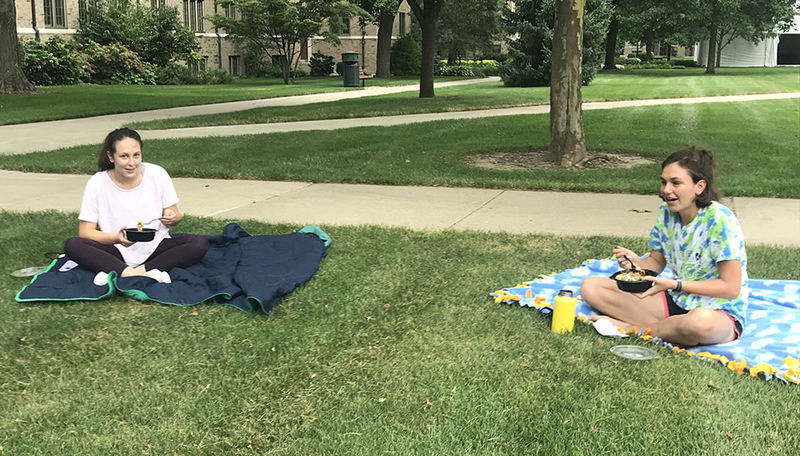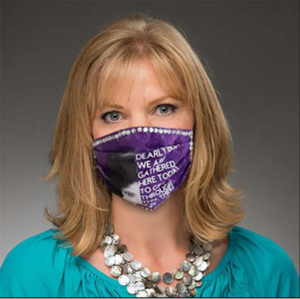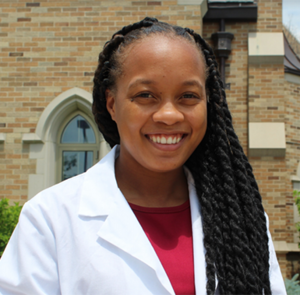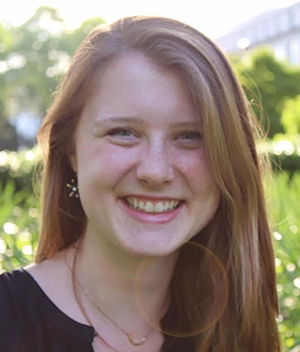 “Grateful to be here.” Cavanaugh Hall resident assistants Claire Mitchell, left, and Bridget Hart are among the first undergraduate students to return to campus. Photo by Margaret Fosmoe
“Grateful to be here.” Cavanaugh Hall resident assistants Claire Mitchell, left, and Bridget Hart are among the first undergraduate students to return to campus. Photo by Margaret Fosmoe
Seniors Claire Mitchell and Bridget Hart sat on the lawn on North Quad on Monday, July 27, eating their dinners out of containers and chatting.
This is Notre Dame in the age of COVID-19, with students encouraged to spend time outdoors, stay at least six feet away from each other and wear face masks except during meals and in their own dorm rooms. Despite the difficult circumstances, the students returning early to prepare for the fall semester are glad to be back.
“We’re very grateful to be here,” Mitchell said. She was hoping not to spend the fall taking her classes online from her family home in Columbus, Ohio.
Mitchell and Hart, both resident assistants in Cavanaugh Hall, are going through staff training in preparation for the arrival of the rest of the student body in time for the August 10 start of classes.
“It puts it in perspective, what’s at stake,” Mitchell said of campus protocols required of students and employees that are designed to help the campus reopening succeed.
Hart is pleased the decision was made to resume in-person classes. She’s looking forward to the semester proceeding as planned, without a spike in coronavirus cases that would mean a shift back to online-only classes. “I hope we can stay here,” she said.
Not all students whole-heartedly endorse the campus reopening.
Junior Joey O’Donnell said students haven’t had enough choice in the matter. He pointed to a growing body of evidence about potential long-term health consequences for individuals, including young adults, who contract COVID-19. “I think right now students deserve the option to be able to (attend classes) remotely from home,” he said by phone from his family home in Cleveland, Ohio.
Will students adhere to mask wearing, social distancing and the other rules Notre Dame has set that are designed to keep people safe?
“I think most students, most of the time, will do an excellent job,” O’Donnell said. “But I’m still worried.” Even if a small number of students choose to attend off-campus parties or go to bars together, he said, the virus could spread and impact the overall health of those on campus.
O’Donnell is considering taking a leave of absence from school or making a COVID-19 related accommodation request to participate in his studies remotely. “My main message is the need for an informed decision,” he said. “Despite the University’s good intentions, without question it is impossible to assure nobody comes down with COVID-19.”
“I was glad campus was reopening,” said Kevin Fox, a senior and resident assistant in Sorin Hall. “I don’t know if I would say I was optimistic, but I was pretty glad the University was going to try.”
Students still have questions about what their daily routines will be like, Fox said, such as who can visit others’ residence hall rooms and how long it will take to get results from COVID-19 tests on campus. “Another concern is political differences. There’s a large part of the population that believes in wearing masks for protection and another part of the student population that doesn’t deny the existence of the virus, but believes the media have overdone it a bit,” he said.
FACULTY RESPONSE
Ed Hums ’75, a teaching professor of accountancy, could have requested an accommodation to teach online. Instead, he’s chosen to teach his four classes for fall in-person.
Hums adapted readily in the spring and summer to online teaching, including virtual quizzes and exams, but he said it’s not the same as teaching in person. “You can’t substitute the dynamics of the classroom,” he said. “I really love teaching in the classroom.”
Classes will be different. Hums will be teaching in a larger room, with students spread out and everyone wearing masks. They’ll have assigned seats and students will be dismissed row by row, to allow for social distancing.
In-person teaching doesn’t mean Hums is taking the risk of coronavirus lightly. “I won’t be touching a piece of paper this semester,” he said, explaining that all assignments will be submitted and graded online. “I’ve had to change what I do teaching-wise, and I don’t think that’s a bad thing. You get reinvigorated.”
Anthropology professor Susan D. Blum will be teaching her fall classes online. She sought and received a faculty accommodation waiver because a member of her household has health challenges. “I think we should have had the option to choose (online teaching) without having to explain ourselves,” she said.
“The prudent thing to do is what many of our peer institutions are doing, which is having as few people on campus as possible,” Blum said. She emphasized that everyone involved in Notre Dame’s planning process for reopening has good intentions. “They are working so hard and trying so hard,” she said.
“Assuming students are going to follow the (safety) rules every day for four months is asking a lot,” Blum said. Although she hopes for the best for the fall semester, she notes the recent rising number of coronavirus cases in north central Indiana. “I expect we will be shutting down again,” she said, and returning to fully online learning.

“So much of our outcome this semester will be determined by how students decide to engage,” said Nancy Michael, an associate teaching professor of biological sciences and director of undergraduate studies for the neuroscience and behavior major. Many students she’s been in contact with over the summer are eager to get back to campus.
Michael had never taught online before, but had experience in recording video and editing that made the spring switch manageable. She led online classes that included students as far away as Japan, Italy and Spain.
Michael will be back in the classroom and laboratory in August to teach four in-person courses. She said she’s not necessarily optimistic or pessimistic about the reopening plan, but rather realistic. The success of in-person classes will be determined by choices individuals make about protecting themselves and others from the virus. “That’s why it’s so important from a leadership position to make it really clear what the expectations are,” she said of personal behavior in the age of coronavirus.
She sent her incoming students an email message conveying enthusiasm about the upcoming semester and noting how the campus experience and expectations will be different this fall. “If our goal is to remain together for the semester — start and finish here on campus — then we have to work together, for each other. We must understand that our campus experience will not look like it has in the past and we must make the choice to make it the best experience we can,” she wrote.
“We’re looking forward to reopening, but there still are continued concerns,” said Thomas Stober, a professor of accountancy and chair of the Faculty Senate, describing the faculty reaction to the plan.
Stober will be teaching his courses online for the fall semester. He filed a faculty accommodation request based on the fact he is over 65, and it was approved. Medical documentation is required for all accommodation requests.
Although the decision announced in May to reopen the campus for in-person learning in August was made primarily by administrators, University leaders since early June have made extensive efforts to meet (via Zoom) with faculty to answer questions and seek feedback, Stober said.
GRADUATE STUDENT RESPONSE

Janeala Morsby, a doctoral student in biochemistry, has been part of Notre Dame’s pilot efforts this summer to begin gradually reopening campus. She opted to participate in the pilot.
Since late May, she and her colleagues have been back at work in a campus research laboratory. But it’s a new kind of normal. They each take their temperatures before reporting to work. The dozen or so lab workers stagger their shifts, some working mornings and some afternoons, so only a few are present at one time. “We all have our own areas we sit in. We wear masks. We wipe down the door handles,” she said. So far, everything has gone well.
Morsby understands why Notre Dame leaders are seeking to provide the in-person experience many students want. She sees people wearing masks and practicing social distancing on campus, and said she feels safe. “I don’t think anyone can be perfect, but Notre Dame is doing its best in every way possible. I applaud them,” she said.

Erin Connelly, a master’s degree student in international peace studies, thinks Notre Dame should continue teaching exclusively online for fall. “My concern is really for the South Bend community,” she said, noting a COVID-19 outbreak on campus likely would spread quickly into the local community. “I understand everyone prefers in-person learning, but at what cost?”
Connelly won’t have to make a choice about in-person learning for fall. She’ll be living in Washington, D.C., and completing a virtual internship for King’s College London. She plans to return to Notre Dame in January. If the risks of COVID-19 remain high, she said she will file an accommodation request based on a health condition and family concerns in order to take her remaining courses online before graduating next May.
She noted Notre Dame is requiring all students to be tested for COVID-19 before returning to campus. Many students will be flying back to South Bend, facing the possibility of catching the virus in flight, after they have tested negative for the virus, Connelly said.
Ryan Karl, a doctoral student in computer science, backs the reopening plan. If it were up to him, he would have designed a plan similar to what Notre Dame has created, said Karl, who is president of the Graduate Student Union executive board.
He’s cautiously optimistic about the campus reopening. “There’s a special undefinable value to being able to conduct your scholarly endeavors at Notre Dame,” he said. “They’ve done everything possible to keep us safe and bring us back.”
Margaret Fosmoe is an associate editor of this magazine.